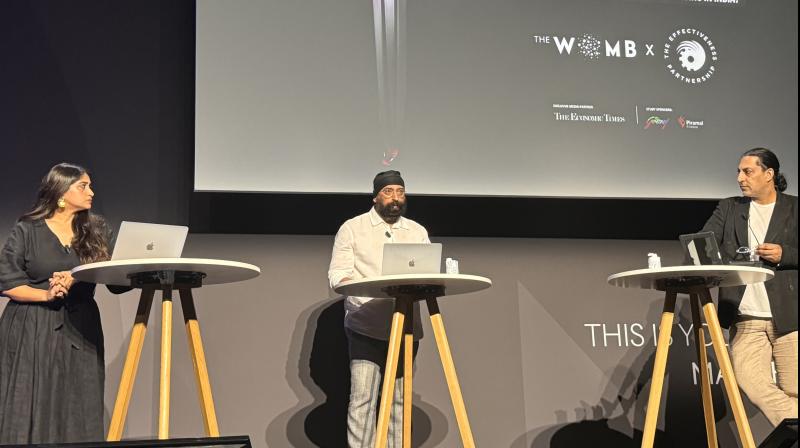On day four of the Cannes Lions International Festival of Creativity, Kawal Shoor, founding partner, The Womb; Manisha Sain, strategy partner, The Womb and Gurdeep Puri, founding partner, The Effectiveness Partnership, in the form of a skit revealed why marketing isn’t getting its fair share of attention from the CEO and CFO.
Before that, Partha Sinha, president, The Times of India Group, stated how marketing as a category is getting lesser coverage in The Economic Times as compared to finance, mergers and acquisitions and technology.
“Print media reflects the reality and truth of what is happening in the world. Brand and marketing significance is losing out to finance, M&A and technology including AI. This is something that’s bothering us at ET. We wanted to understand the depth of this story. So when The Womb and The Effectiveness Partnership reached out to us to be part of this, we were keen to understand why it’s happening,” he said.
In the subsequent skit, Sain played the role of a CMO and Puri of a CEO.
Shoor set the context by saying, “It’s clear that the share of marketing has fallen off the charts. Marketing isn’t getting its fair share of attention from the C-suite. On the other hand, marketing and its effectiveness is a huge chat on the likes of LinkedIn. Even this week (at Cannes) many people have spoken about it, but we haven’t heard enough of it from the CEO and CFO lens.”
The Womb, The Effectiveness Partnership and Quantum worked together on this research, which had a combined size of 200. 67 of these were CEOs, 33 CFOs and 100 CMOs.
Shoor listed seven growth levers:
- Build economies of scale
- Leverage technology
- Build a perceptual advantage/edge through marketing
- Acquire, nurture and retain the best talent
- Drive digital transformation
- Bring about innovation in different aspects of the business
- Develop the best internal processes and practices
According to the research conducted both CMOs and CEOs ranked ‘building a perceptual advantage or edge through marketing' third.
According to CEOs, their top worries about growing the business include:
- Big data/data overload
- Sustainability
- Rapid changes in technology
- Legislative/regulatory framework
- Need for cost-cutting/budget limitations
- The growing complexity of measuring marketing impact on digital and social media channels
- Globalisation/international business challenges
- Supply-chain problems
- Under investment in brand/over-investment in ‘performance marketing’
- Growing consumer cynicism/lack of responsiveness
- Relating marketing’s creative activities to commercial returns
Puri stated that according to the CEOs, marketing and its impact, complexity and returns were their top concern. “We are deeply concerned about the investment made in marketing and its return. We don’t only worry about big data and data overload,” he said.
Shoor stated that marketers have failed to showcase that marketing demonstrates commercial value as a result of which 50% of the CEOs and CFOs stated that they don’t believe marketing drives behaviour change.
Reasoning this Puri said, “That’s because most of the time the marketing metrics are about reach and impressions. That’s not behaviour change for CEOs.”
The study also posed a question about whether marketing worked as intended for the CEOs, CFOs and CMOs.
74% of the CEOs stated that they didn’t believe it was effective and didn’t work as intended. 60% of the CMOs stated the same, while 68% of the CFOs agreed with that notion.
Adding to the previous point about marketing metrics being incorrect, Puri added, “Marketers are probably tracking the wrong metrics. They are tracking brand equity, total awareness, spontaneous awareness, brand consideration and preference. Only 3% of them look at sales volumes and revenues. Social media mentions are more important for them”
“For CEOs, the metrics are spontaneous awareness followed by revenue and volume,” he further added.
The study also revealed that CEOs don’t take personal accountability for brands, with less than one in five taking accountability for long-term brand campaigns. According to the study, this is because both CEOs and CFOs believe that accountability of long-term brand campaigns is the role of the CMO.
Reasoning with this Shoor said, “CEOs need to take more responsibility. Marketers end up leaving organisations after a few years, but CEOs are appointed by the shareholders as representatives. Marketing people go to markets. Rarely does a CFO go to the market to get a real feel.”
The panel ended with both the CMO and CEO looking at a common ground.
Sharing the CMO point-of-view, Sain said, “We have to get the CEO and CFO to see our life and challenges. But at the same time, we will take accountability for the commercial value of work. We will partner with my CFO to drive long-term profitability.”
Giving the CEO’s perspective, Puri said, “We as CEOs aren’t as brand-centric as we were. There has to be a seismic change. The work that we build for the short term builds the brand for the long term. If the c-suite are the custodians for the business, they are responsible for the assets too.”










